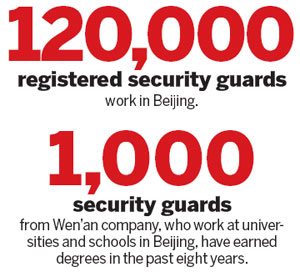Secure in the knowledge
Updated: 2011-10-28 08:06
By Guo Shuhan (China Daily)
|
|||||||||
|
Security guard Zheng Yafei studies at University of Mining and Technology in Beijing during breaks of his work. Zou Hong / China Daily |
Some on-campus security guards alternate between standing outside classrooms as protectors and studying inside as students. Guo Shuhan reports.
Zheng Yafei dashes out of a University of Mining and Technology (CUMT) classroom, clad in a sports coat and cradling a stack of textbooks and notes. About 10 minutes later, he stands at attention in front of the building's main door in his security guard uniform.
But it's the graduation gown that he dreams of wearing, he says.
The 23-year-old, who has stood guard outside the building's gate for more than six years, spends his spare time inside its classrooms. Like many of his colleagues, Zheng never enjoyed the opportunity to continue his education. But his desire for knowledge has never ceased to guide him.
Zheng had only a junior middle school education when he came to Beijing in March 2005. He took the security position at the university on the advice of his elder cousin, who had done the same at the Beijing University of Aeronautics and Astronautics (Beihang).
"I'd see students reviewing their textbooks in (CUMT's) garden when I was doing drills in the morning," he says.
"That made me think perhaps I could read these books, too, since I'd found a way to make a living. I feel envious when I see students taking photos in their graduation gowns. I dream I could someday be one of them."
Zheng is the eldest child of a farmer's family in Feixiang county's Zheng village in Hebei province. His parents couldn't afford tuition for both him and his younger sister.
Soon after moving to Beijing, the then 18-year-old used most of his monthly 800-yuan ($125) salary to enroll at Beijing Open University, where he completed the equivalent of a high school degree with a focus on finance and accounting in 2008.
He passed the Adult University Entrance Examination and became a computer science student in Beihang's School of Continuing Education in 2009.
"Zheng is great," CUMT student Si Xiuyu says.
 |
"Most students don't want to spend their spare time studying. But he does."
Si says he often sees Zheng reading New Concept English texts at his workstation.
"Zheng reads books during breaks, while the other guards play with their mobile phones," Si says.
One of the two desks in the dormitory Zheng shares with three other guards is covered with his textbooks, English materials, dictionaries and novels. The desktop computer he bought last year is on the other.
He struggles most with calculus and English, he says. He thumbs through comic books when he feels overwhelmed by the complicated formulas. English-language stories, even if they're only four paragraphs long, can bind him to his dictionary for a long time, he says.
His shifts last either from 8 am until noon and resume from 6 until 10 pm, or from noon until 6 pm and resume from 10 pm until midnight.
He must often rush from class to return to his post.
Zheng says there are no words for the transformation that studying has brought to his work and life. He knew nothing about computers and the Internet when he came to the capital but can now type the team performance reports the security company requires.
Nearly 1,000 of Zheng's colleagues, who also work at universities and schools, have earned degrees in the past eight years, according to the company Wen'an, which specializes in offering on-campus security jobs.
The company operates under the Beijing Security Service Head Corporation (BSSH) operated by the Beijing Municipal Public Security Bureau.
"A highly intellectual atmosphere at colleges and universities requires a high standard of service," Wen'an's manager Wang Geng says.
"So we hope our employees are of relatively high quality and encourage them to absorb knowledge."
Wen'an has required its university security team leaders to hold at least an associate's degree since 2004. Those responsible for several schools must have a bachelor's degree. Employees with associate's degrees or higher earn an extra 50 yuan a month.
The company also covers tuition for certain programs, such as Beijing Open University's courses designed specifically for security guards.
Employees can apply for transfers if the school they work at isn't where they study.
"Diplomas don't directly translate into knowledge levels, but we find team leaders improve their management after receiving schooling," Wang says.
"And becoming a student makes the guards feel they are not merely service providers but also part of the school community."
BSSH and other private companies employ about 120,000 registered security guards in the capital, Beijing Daily reported in late September.
The newspaper said the number hasn't increased for years because low salaries and poor working conditions have stemmed recruitment.
Wang Maosen, a director responsible for guards at six universities, says Wen'an hopes to increase and stabilize its employment through offering university study opportunities. Most guards quit after six months, but those who study tend to stay for at least two years.
The director says about 60 percent of the 156 security guards who obtained associate's degrees, and 30 percent of 68 guards who have graduated from universities in the past 17 years, have chosen to stay longer.
Liang Shunting works in Wang Maosen's team at the Central University for Nationalities. The undergraduate law student in the school's Continuing Education School is preparing to take the Band Three of College English Test in early December.
The 25-year-old from Taodeng township in Laibin city, in the Guangxi Zhuang autonomous region, was one of only three high school graduates in his hometown in 2005. But he had to forfeit his higher education opportunities for his younger sister's.
Although some security guards believe learning is useless, Liang believes the old Chinese saying: "Through study, one wins success and fortune follows."
He plans to stay with the company after graduation because he believes his chances for promotion will improve with a bachelor's degree.
Zheng also plans to stay. He says he enjoys learning and isn't as concerned with how his degree will advance his career.
Zheng says he felt uncomfortable when the media saturation covered security guard Jia Zuosheng's admission to Shandong Normal University.
"Security guards are people like anyone else," he says.
"I hope the media will focus more on the spirit of learning than our identities."












